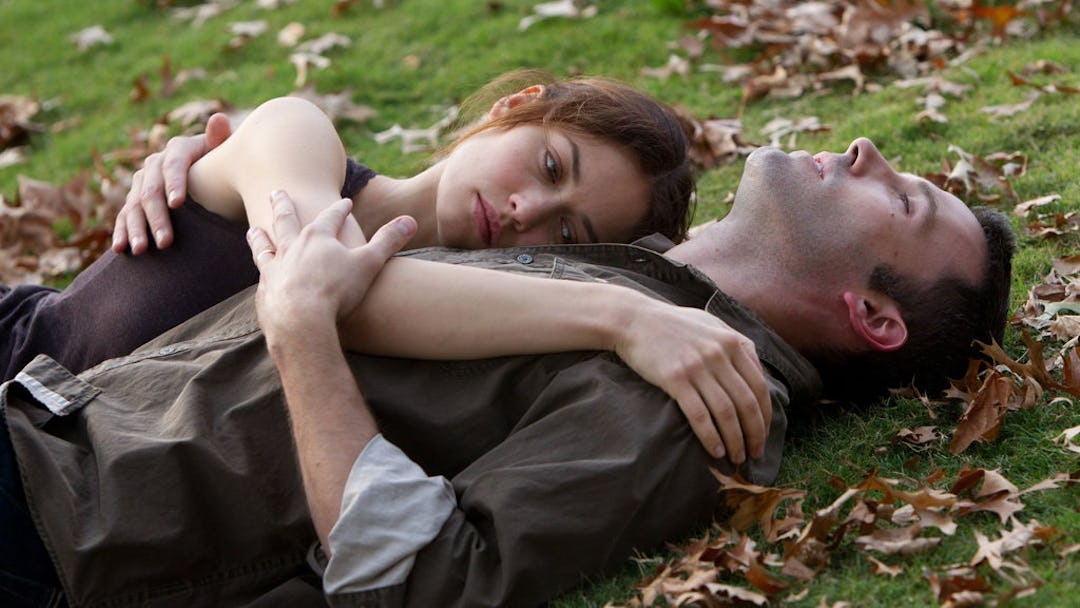Terrence Malick tries to do something really interesting in his new picture To the Wonder, and to his credit, he almost pulls it off. He’s telling the story of an intense personal relationship (from nearly the beginning to the bitter end), but only on the downbeats — it’s done not via dialogue and other conventional means, but in pauses and reactions and aftermath. We don’t see, for example, a confession of infidelity, but the fallout of that confession; we’re shown a character’s moment alone after being left, but spared the scene where the revelation is made. To the Wonder may contain less person-to-person dialogue than any “talkie” I’ve ever seen. The question is whether that’s the right method for telling this story.
This is not to say that there’s no talking in the film — it’s that (no surprise if you’ve seen any of Malick’s previous work) it is mostly in voice-over, interior monologues that illustrate striking visuals. The opening narration is as follows: “Newborn. Open my eyes. I melt. Into the eternal night.” It’s in subtitled French. Hope you know what you’re getting into, the movie seems to say.
Its first images are dirty, messy, grainy home video, capturing Marina (Olga Kurylenko) and Neil (Ben Affleck) in Paris. They are young and attractive and in love. They frolic and kiss; they whisper and embrace. Some of that whispering occurs in the voice-over, where one can’t help but notice that they are speaking of each other in the past tense. We’ll figure out why soon enough; in the meantime, Neil invites Marina and her daughter to come back to the States with him. It’s plenty idyllic, but the daughter says “there’s something missing,” and she’s right.
Meanwhile, Javier Bardem appears in what is, in many ways, the Sean Penn role. As a priest suffering a crisis of faith, he speaks his voice-over in his native Spanish (Malick seems to enjoy the multilingual mosaic), and the similarity of his words to Marina’s is striking — because he is speaking to God. In his encounters with his staff and the poor people he ministers to, Malick soaks up a good deal of local color; much of the film was shot in Oklahoma, and the vibrancy of the church janitor or the matter-of-fact prisoner (asking for forgiveness while irritated by the bright sunlight) add a nice dose of personality.
It would be nice if the picture weren’t in such dire need of it. The little jolts of electricity added by those day players (all non-actors, I’d bet) end up emphasizing how dour our main characters are. Affleck in particular ends up a bit of a cipher, but in fairness to the actor, Malick doesn’t give him all that much to play. The filmmaker is dealing in big themes here (guilt, obligation, regret, fidelity), but it is nearly impossible to tell a story of a crumbling relationship if we’re not given the opportunity to see how the players involved communicate with each other.
“How had loved turned to hate?” Marina asks — in voice-over, of course — late in the story, and it’s a good question that we don’t really get an answer to. There’s no real sense of why they go wrong (or how), and in spite of the many interior monologues, the characters’ motivations are hazy at best. They seem to get together because they’re supposed to, and drift apart because it’s time for the movie to end. In its own way, it’s an involving picture, but Malick’s form is too frequently working against his content.
To the Wonder is, it seems unnecessary by now to say, intoxicating to look at — Malick finds beauty not just in magic hour skylines but small-town grocery stores and suburban developments and Sonic drive-ins (even if the shots of characters gliding through wheat fields are becoming self-parody; it’s like Scorsese trotting out “Gimme Shelter” again). And it benefits from its small scale and ambition — no dinosaurs this time around, thankfully. But if you’re going to tell the story of a relationship, you have to eventually get around to dramatizing that relationship. Otherwise, what you’ve got on your hands is an act of faith.
